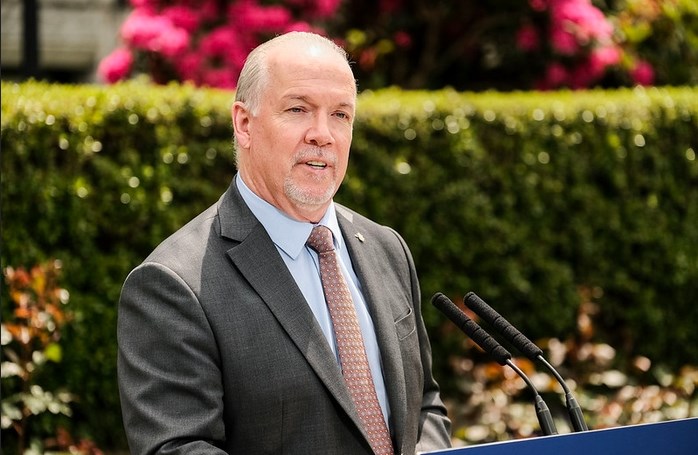
Premier John Horgan
Image Credit: Flickr/Province of B.C.
July 16, 2020 - 2:20 PM
Premier John Horgan praised the federal government’s new $19 billion Safe Restart Program today, in part, for agreeing to create a nation-wide sick leave program.
Since early in the COVID-19 pandemic, he has been pushing other premiers to join him in pressing the federal government to take this on and today, July 16, the prime minister agreed.
“We had planned, within the $1.5 billion (provincial restart budget) to fund a paid sick leave program, so these are dollars we won’t have to try to find,” Horgan said. “I’m grateful that a Canada-wide approach to a Canadian challenge has been met, not just with enthusiasm but with a commitment to go further if required by the federal government.”
READ MORE: Feds, provinces reach deal on funding for reopening, Trudeau announces
He noted that from the start, one of provincial health officer Dr. Bonnie Henry’s greatest concerns had been making sure people didn’t go to work when the feel sick.
Details of how the program will work have still to be worked out and it will be up to the federal government to announce them, but the provinces will all have to amend their Employment Standards Acts to allow for the change.
Horgan also focused on B.C.’s other health care emergency, the opioid crisis that saw a record 175 B.C. residents die from overdoses in June alone.
READ MORE: Another record month of drug overdose deaths in B.C.: Chief Coroner
“We need a national plan,” Horgan said. “Although British Columbia is hard hit on this, we’re not the only ones in the country.”
He said he will continue to pressure the federal government to decriminalize personal use of opioids and to help create a safe drug supply.
The premier objected to a suggestion the opioid crisis is being overshadowed by the province’s reaction to COVID-19, given that about the same number of deaths were caused by COVID-19 in the first six months of the year versus one month of opioid deaths.
“I think that these are two separate things,” Horgan said. “We have an insidious virus that affects anyone at any time and we have opioid crisis that involves people using drugs. Those are choices, initially, and then they become dependencies. So, once people make those choices they’re no longer in a position to stop making those choices without medical intervention. The fact that the numbers are similar is a coincidence.”
To contact a reporter for this story, email Rob Munro or call 250-808-0143 or email the editor. You can also submit photos, videos or news tips to the newsroom and be entered to win a monthly prize draw.
We welcome your comments and opinions on our stories but play nice. We won't censor or delete comments unless they contain off-topic statements or links, unnecessary vulgarity, false facts, spam or obviously fake profiles. If you have any concerns about what you see in comments, email the editor in the link above.
News from © iNFOnews, 2020